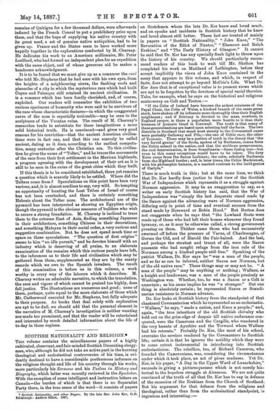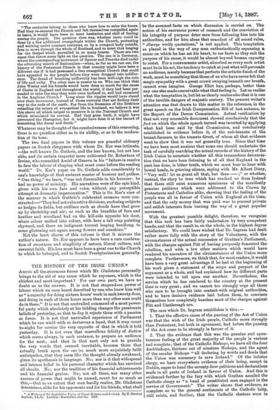SCOTTISH NATIONALITY AND RELIGION.• Tuts volume contains the miscellaneous papers
of a highly cultivated, observant, and fair-minded Scottish Dissenting clergy- man, who, although he did not take an active part in the burning theological and ecclesiastical controversies of his time, is evi- dently destined to have a considerable posthumous influence on the religious thought and life of his country through his works, more particularly his Sermons and his Psalms in History and Biography, which latter was recently reviewed in the Spectator. With the exception of some intelligent and instructive letters on Canada—the burden of which is that there is no Separatist Party there, in the true sense of the word—it consists of papers • Scottie. Xattonalitn. and other Paper.. By the late Bee. John Ker, D.D. Edinburgh; Andrew Elliot. 1887.
on Scotchmen whom the late Dr. Ker knew and loved much, and on epochs and incidents in Scottish history that he knew and loved almost still better. These last are treated of mainly in papers on " Scottish Nationality," " John Knox," "The Revocation of the Edict of Nantes," "Ebenezer and Ralph Erskine," and "The Early History of Glasgow." It cannot be said that Dr. Ker has any specially fresh light to throw upon the history of his country. We should particularly recom- mend readers of this book to wait till Mr. Skelton has completed his work on Maitland of Lethington, before they accept implicitly the views of John Knox contained in the essay that appears in this volume, and which, in respect of facts, does not attempt to go beyond McCrie's Life. What Dr. Ker does that is of exceptional value is to present views which are apt to be forgotten by the devotees of special racial theories. Take, for example, what he says on the historical and religions controversy on Celt and Teuton :- "If the Celts of Ireland have become the ardent retainers of the Papal Chair, the Celia of Wales, a kindred branch of the same great stock, have shaken off its influence more thoroughly than their English neighbours; and if Brittany is devoted to the mass, nowhere, in England proper, is there a population more hostile to it than their kinsmen of Armoric, blood in Cornwall. The truth is that many of these generalisations are based upon selecting half the facts. The two districts in Scotland that stood most sternly to the Covenanted cause were probably Galloway and Fife,—the one of Celtic raoe, the other of Teutonic. There may be a portion of troth in the theory that the very fervid genius' of the Scots, spoken of by Buchanan, comes from the Celtic subsoil in the nation, and that the stubborn perseverance, the cool determination, is from Soandinavia—flame falling iron—but even to this many exceptions would have to be taken. The fiery Knox came from the Saxon Lothians ; the calm, scholarly Buchanan from the Highland border ; and, in later times, the Celtic Mackintosh, with his philosophic; balance, is a marked contrast to the lurid genius of Carlyle."
There is much truth in this ; but at the same time, we think that Dr. Ker hardly does justice to that view of the Scottish War of Independence which represents it as a struggle against Norman aggression. It may be an exaggeration to say, as a writer on early Scottish history has said, that the War of Independence was "simply the last desperate stand made by the Saxon against the advancing wave of Norman aggression, differing only in point of time and eventual success from the stand made by Hereward or Robin Hood." But Burton does not exaggerate when he says that " the Lowland Scots were made up of those who had left their homes whenever they found tyranny, or, as it may be otherwise called, a strong government pressing on them. Thither came those who had successively swarmed off before the pressure of Yarns, of Charlemagne, of Gorme the Old, and of Harold the Fair-haired. And the last, and perhaps the stoutest and truest of all, were the Saxon peasants who had sought refuge from the iron rule of the Normans among a kindred people still free." Speaking of the patriot Wallace, Dr. Ker says he " was a man of the people, and so far as can be inferred, neither Saxon nor Norman, but of the old native race." These things may or may not be. " A man of the people" may be anything or nothing ; Wallace, ae a knight and landowner, was a man of the people precisely as Washington was. Whether, too, he was a Saxon or a Celt is uncertain; as his name implies he was "a stranger." But one thing is absolutely certain; he represented Saxon or Scandi- navian resistance to Norman advance.
Dr. Ker looks at Scottish history from the standpoint of that chastened Covenanterism which he represented as an ecclesiastic. " Wallace," he says, " made a nation, and Knox a people ;" and, again, " the true inheritors of the old Scottish chivalry who held out on the grim edge of despair till native endurance con- quered, were the Cameron and the Cargills, who wandered in the very haunts of Ayrshire and the Torwood where Wallace had his retreats." Probably Dr. Ker, like most of his school, overrates the services rendered by the Covenanters to Scottish life; certain it is that he ignores the acridity which they were to some extent instrnmental in introducing into Scottish ecclesiasticism. The rebellion, too, of Richard Cameron, who founded the Cameronians, was, considering the circumstances under which it took place, an act of pious madness. Yet Dr. Ker, in his paper, "A Day in the Upper Ward of Lanarkshire," succeeds in giving a picturesqueness which is not merely his- torical to the hopeless struggle at Airsmoss. We are not quits convinced of the truth of all that Dr. Ker has to Bay in defence of the secession of the Erskine from the Church of Scotland. But his argument for that defence from the religious and theological, rather than from the ecclesiastical standpoint, is ingenious and interesting :— "The centuries belong to those who know how to seize the boors. Had they re-entered the Church and felt themselves compelled again to leave, it would have been to meet hesitation and chill of feeling among the people. The question then was, whether more could be done by a few additional evangelicals within the Church, protesting and working under constant restraint, or by a compact body outside, free to move through the whole of Scotland, and to meet that longing for the Gospel which prevailed in so many hearts. There are two Mlles that throw some light on the question. The one is in Germany, where the corresponding movement of Spener and Franoke died under the advancing march of Rationalism—when, so far as we can see, the history of the Protestant Church in that country might have been a different one if it had possessed a free evangelical Church that could have appealed to the people before they were drugged into indiffer. enoe. The dread of breaking uniformity has been well-nigh the rain of life and unity. The other case is nearer to on Who can think that John Wesley and his friends would have done so much for the cause of Christ in England and throughout the world, if they had been per- seeded to take the step they were ones inclined to, and had remained in the Anglican Church P Long since the ripples would have closed over their movement, instead of those currents that are finding their way to the ends of the earth. Far from the Secession of the Erakines retarding the return of evangelical life in Sootland, we believe it was this above all which helped to preserve it in the National Church and which stimulated its revival. Had they gone back, it might have prevented the Disruption, but it might have done it at the hazard of something like decay and death."
Whatever may be thought of the conclusiveness of this reasoning, there is no question either as to its ability, or as to the modera- tion of its tone.
The two final papers in this volume are graceful obituary papers on Scotch clergymen with whom Dr. Ker was intimate, —the well-known Dr. Guthrie, and the less known, but not less able, and (in certain respects) more cultivated Dr. Robertson of Irvine, who resembled Amiel of Geneva in his " failure in resolve to face the labour of shaping what must come before the reading world." Dr. Kees paper on Dr. Guthrie adds considerably to one's knowledge of that eminent master of humour and pathos. " One thing," we learn, "was not discernible in his humour : he had no power of mimicry. His narratives were of the epic kind, given with his own face and voice, without any perceptible attempt at dramatic impersonation." This is Dr. Ker's view of the manner in which Gathrie's celebrated sermons were con- structed :—"They had not exhaustive divisions, enclosing subjects as hedges do fields, but outlines such as clouds have that grow up by electricity and air ; or such as the breadths of fern and heather and woodland had on the hill-side opposite his door, where colour melted into colour, with here a tall crag pointing skyward, and there an indignant torrent leaping headlong, to some glistening out again among flowers and sunshine."
Not the least charm of this volume is that it mirrors the author's nature. Dr. Ker appears to have been a rare combina- tion of sweetness and simplicity of nature, liberal culture, and reverent faith. His loss must have been a great one to the Church to which he belonged, and to Scotch Presbyterianism generally.



































 Previous page
Previous page